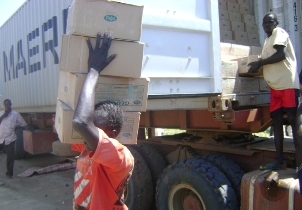Juba–Bor road closing surges prices in Jonglei
By Philip Thon Aleu
November 3, 2009 (BOR) – Prices for imported items have nearly double in Bor, the capital of Jonglei state, a joint reporters’ finding established Monday November 2. Traders say “we are combating loses” attached to ambushing of vehicles by armed men along Juba—Bor road.

A Somali driver, who had just arrived from Juba, explained that after reaching Mugala heading here, soldiers accompany the trucks to Bor territory and return when security is seen safe. Speaking on condition of anonymity, he says “the owner of these items [pointing to loads in his truck] paid some money to soldiers for their services [escort]. It’s a risky business.” Hiring a truck from Juba to Bor, according to traders cost 8,000 SDG. Other expenses including paying military escort and taxes on road by various units amount to 2,000 SDG summing to 10,000 SDG.
“So, when you reach Bor, you add all those expenses and let the buyer pay,” a businessman identified as Mayen explained adding that “we avoiding and combating loses.”
At Maror market in Bor, many shops are closed. Nearby shops are at last stocks. The scenario is that prices for food items, imported from Uganda and Kenya, are rushing forward. A 50kg bag of sugar initially brought at 110 Sudanese Pounds (SDG) is now at 185 SDG. A 50kg maize flour originally at 80 SDG surges to 130 SDG, a crater of soda increased to 45 SDG from 30 SDG and worse still, a 50kg back of bean now stands at 400 SDG up from 200 SDG. Future prices are expected to be higher and would negatively affect the poor buyers – employed or persons displaced to Bor town from villages.
BUYING ‘BY LUCK’
A trader identified as Ahmed, who deals in food items says “These are the last items in my shop. Goods are very scarce and you have to struggle, at high prices, to get some.” Most traders rent shops in this market. Others have given up and opt to close the shops. However, shops owners do not care and turn-up at the end of month to collect their dues. “Whether I stop this business, is not a solution. We agreed till end of December, [2009],” A woman pouring tea for thirsty customers answered when asked whether there is little she is making after sugar price increment.
A car loaded with maize flour has just arrived to the market. Retail traders let no chance and thus, wholesalers do not worry paying blockers to offload the bags – ‘your customer is your porter.’ A woman buying directly from the wholesaler says she is compelled by circumstances. “What else can I do?” she says when asked why she was buying at such high price adding “getting something to buy is by luck.”
The horrors of Juba – Bor road blockage are also felt by government staffs. “My salary is 300 SDG. If a bag of maize flour is now 130 SDG, how can I manage my family,” John Chol, a primary teacher shopping at Maror market responded when asked to commend as a buyer on surging prices.
Meanwhile, in remote part of the market – at Southern Sudanese standard, prices are stable for locally products/produces. Sellers of milk, pumpkin, cabbages, firewood, charcoal and others have not charge extra pounds since January according to buyers and sellers in this part of the market dominated by indigenous people.
Deputy Chairperson of Jonglei traders union, Ayuel Arok, known in short as Muzee, blasts the behaviors of government forces on Bor – Juba road while providing security.
“This is totally unacceptable for soldiers executing their duties to overcharge traders;” Mr. Arok says adding “we are going to sort out with the government to explain the meaning of this because we [traders] pay taxes.”
Mr. Arok, however, observed that the taxation officers have being cheating them with heavy taxes and would now allow another burden to protect local people from inflating prices.
On averting security on along Juba – Bor road, traders argue that the government should speed up resettlement of Mundari villagers displaced to western bank of River Nile so that local chiefs take charge of their criminals “because that place have become a haven for gangsters. Not all ambushes are carried out by Mundari.”
The price increment in Bor town, the capital of Jonglei state, affect other markets in rare counties since this is the only state town connected to Juba by road all seasons. When goods are inadequate in Bor, traders from Ayod, Akobo and beyond have one choice – to scrap other item from shopping list and maintain food items to feed starving population as a result of frequent tribal conflicts.
“The government should provide security. This is the role of the government,” Mr. Arok says.
(ST)
